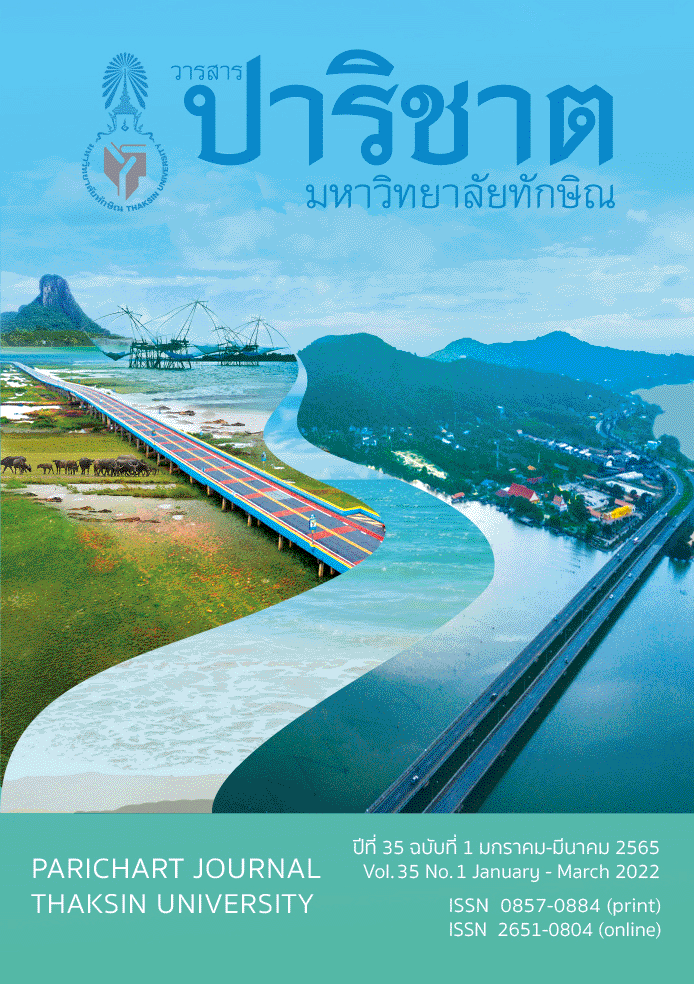Local Innovations on Revenue Enhancement: Concepts and Experimental Findings
Main Article Content
Abstract
This paper explores plausible ideas for local revenue development in Thailand based on system and behavioral approaches. Four major initiatives have been constructed in Chiang Mai, Singhaburi, Ubon-Ratchathani and Songkhla Provinces. The initiatives comprise (i) Local government collaboration for taxpayers’ databases; (ii) Use of information technology for local tax collection; (iii) Application of nudge approach to increasing willingness-to-pay taxes; and (iv) Civic participation for local tax administration. Experimental studies have been conducted in six local contexts in order to test the applicability of the four measures. Findings show that these initiatives deliver impressive results in elevating local revenues. Therefore, they can be expanded to Thai local governments in general and central government should encourage and provide policy platforms for other localities to apply these new strategies.
Article Details

This work is licensed under a Creative Commons Attribution-NonCommercial-NoDerivatives 4.0 International License.
References
Research and Consulting Service of Thammasat University. (2009). Review of Thailand’s
Decentralization Progress. Final report to Department of Local Administration.
Waranyuwattana, S. (2013). Fiscal Decentralization to Local Governments: Concepts and
Practices in Thailand. Bangkok: Thammasat University Press.
Krueathep, W., Suwanmala, C., & Komut, W. (2014). Fifteen-Year Evaluation of Thai
Decentralization. Final report to Office of the Prime Minister’s Office.
Krueathep, W. (2005). Local Government Innovations in Thailand. Bangkok: Thailand Research Fund.
Patmasiriwat, D. (2008). Local Finance. 3rd edition. Bangkok: P.A. Living.
Suwanmala, C. (1998). Reforming Thai Public Finance. Bangkok: Thailand Research Fund.
Ruchupandu, S. (2002). Local Government Revenues: Problems and Solutions. Bangkok: Thailand Research Fund.
Krueathep, W. (2007). Sustainable Approaches to Local Economic Development: Lessons Learned from Local Innovations. King Prajadhipok’s Journal, 5(2), 60-71.
Behavioural Insights Team. (2016). The Behavioural Insights Team’s Update Report 2015-16. (Online). Retrieved on November 1, 2017, from http://www.behaviouralinsights.co.uk/publications/the-behavioural-insights-teams-update-report-2015-16.
Boyd, N. M., & Martin, E. C. (2020). Sense of Community Responsibility at the Forefront
of Crisis Management. Administrative Theory & Praxis, 42(2), 1–13.
Patel, M., Joshi, B., Bhagat, K., Desai, H., & Parmar, J. K. (2018). IOT Based Toll Collection System Using Image Processing. International Journal of Computer Engineering & Technology, 9(3), 132-139.
Tannu, A., Shelar, G., Tandon, M., & Singh, P. (2015). Vision Based Automatic Toll Tax
Collection System using Image Processing and Wireless Technology. International Journal of Engineering Research & Technology, 3(6), 1-4.
Touchton, M. R., Wampler, B., & Peixoto, T. C. (2019). Of Governance and Revenue:
Participatory Institutions and Tax compliance in Brazil. Policy Research Working Paper No. 8797 of the World Bank.
Office of Decentralization to Local Government. (2017). Criteria for Local Good Government Award, Fiscal Year 2017. Bangkok, Office of Decentralization to Local Government.
Ichimura, S., & Bahl, R. (2009). Decentralization Policies in Asian Development. Hackensack, NJ: World Scientific Publishing.
Samanbutr, P. (2008). Enhancing Capacities of Provincial Administrative Organization in Gasoline Taxes Collection. Final report to Thailand Research Fund.
Thaler, R. H., and Sunstein, C. R. (2008). Nudge: Improving Decisions about Health, Wealth, and Happiness. London: Penguin Books.
John, P., Smith, G., & Stoker, G. (2009). Nudge Nudge, Think Think: Two Strategies for
Changing Civic Behavior. The Political Quarterly, 80(3), 361 – 370.
Krueathep, W. (2004). Local Government Initiatives in Thailand: Cases and Lessons
Learned. Asia-Pacific Journal of Public Administration, 26(2), 217-239.
Suwanmala, C. (2007). Thailand: Civic Participation in Subnational Budgeting. In Anwar
Shah (Ed.), Paticipatory Budgeting, 127–154. Washington, D.C.: The World Bank.
Na Chiang-Mai, C. (2002). Balance Participation in Local Community Development. In
Decentralization and Local Governance in Thailand. 405-416. Nonthaburi: King Prajadhipok.
Krueathep, W. (2010). Are Local Voices Getting Heard in Local Budget Making Processes?. Bangkok: Thailand Research Fund.
Roemer, J. E. (1993). Would Economic Democracy Decrease the Amount of Public Bads?. Scandinavian Journal of Economics, 95(2), 227–238.
Musgrave, R. A., & Musgrave, P. B. (1989). Public Finance in Theory and Practice. New York, N.Y.: McGraw-Hill.
Ostrom, E. (1990). Governing the Commons: The Evoluation of Institutions for Collective Action. Cambridge, United Kingdom: Cambridge University Press.
Brautigam, D., Fjeldstad, O., & Moore, M. (2008). Taxation and State-Building in Developing Countries: Capacity and Consent. New York, NY: Cambridge University Press.
Suwatwitayakorn, D. (2008). Local Government Revenue in Thailand. Bangkok: King Prajadhipok.
Fisher, D. (2004). The Demonstration Effects Revisited. The Annals of Tourism Research, 31(2), 428-446.
Hallsworth, M. (2014). The Use of Field Experiments to Increase Tax Compliance. Oxford Review of Economic Policy, 30(4), 658-679.


